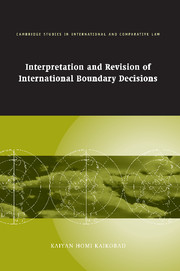Book contents
- Frontmatter
- Contents
- List of maps
- Preface
- Acknowledgments
- Table of cases
- List of abbreviations
- Part I Introduction
- Part II The settlement of territorial and boundary disputes
- Part III Judicial remedies: interpretation
- Part IV Judicial remedies: revision
- 7 The revision of judgments and awards
- 8 General features of revision
- 9 The classification of the notion of revision
- 10 Issues of admissibility
- 11 Selected substantive and procedural aspects of revision
- Part V Conclusions
- Select bibliography
- Index
- CAMBRIDGE STUDIES IN INTERNATIONAL AND COMPARATIVE LAW
7 - The revision of judgments and awards
Published online by Cambridge University Press: 14 September 2009
- Frontmatter
- Contents
- List of maps
- Preface
- Acknowledgments
- Table of cases
- List of abbreviations
- Part I Introduction
- Part II The settlement of territorial and boundary disputes
- Part III Judicial remedies: interpretation
- Part IV Judicial remedies: revision
- 7 The revision of judgments and awards
- 8 General features of revision
- 9 The classification of the notion of revision
- 10 Issues of admissibility
- 11 Selected substantive and procedural aspects of revision
- Part V Conclusions
- Select bibliography
- Index
- CAMBRIDGE STUDIES IN INTERNATIONAL AND COMPARATIVE LAW
Summary
Preliminary observations
A judicial remedy closely related to, but different from, the interpretation of judgments and awards is that of the revision of decisions, that is to say, the power of a tribunal to revise its judgment or award. In view of the pre-eminent status of the International Court of Justice, perhaps the most authoritative provision on the matter is Article 61 of its Statute, paragraph 1 of which provides the basic rule. It stipulates:
An application for revision of a judgment may be made only when it is based upon the discovery of some fact of such a nature as to be a decisive factor, which fact was, when the judgment was given, unknown to the Court and also to the party claiming revision, always provided that such ignorance was not due to negligence.
Paragraph 2 provides that the proceedings shall be opened by a judgment in which the Court expressly records the existence of the new fact, recognises that it has such a character as to lay the case open for revision and (accordingly) declares the application admissible on that ground. Paragraph 3 states that the Court may require compliance with the terms of the judgment before it admits proceedings in revision. Paragraphs 4 and 5 provide temporal limits. All applications are to be made within six months of the discovery of the new fact, and a final overall time limit is placed for applications for revision at ten years from the date of the judgment.
- Type
- Chapter
- Information
- Interpretation and Revision of International Boundary Decisions , pp. 231 - 251Publisher: Cambridge University PressPrint publication year: 2007



